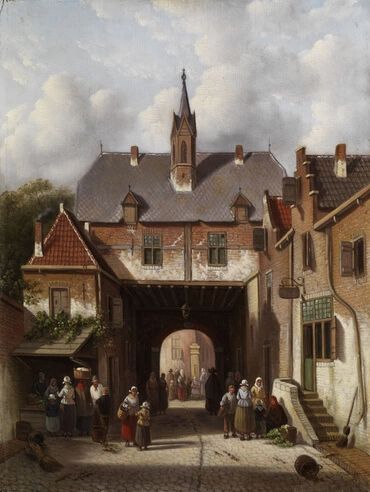1
Então me levantou o Espírito, e me levou à porta oriental da casa do Senhor, a qual olha para o oriente; e eis que estavam à entrada da porta vinte e cinco homens, e no meio deles vi a Jaazanias, filho de Azur, e a Pelatias, filho de Benaías, príncipes do povo.
2
E disse-me: Filho do homem, estes são os homens que maquinam a iniqüidade, e dão ímpio conselho nesta cidade;
3
os quais dizem: Não está próximo o tempo de edificar casas; esta cidade é a caldeira, e nós somos a carne.
4
Portanto, profetiza contra eles; profetiza, ó filho do homem.
5
E caiu sobre mim o Espírito do Senhor, e disse-me: Fala: Assim diz o Senhor: Assim tendes dito, ó casa de Israel; pois eu conheço as coisas que vos entram na mente.
6
Multiplicastes os vossos mortos nesta cidade, e enchestes as suas ruas de mortos.
7
Portanto, assim diz o Senhor Deus: Vossos mortos que deitastes no meio dela, esses são a carne, e ela é a caldeira; a vós, porém, vos tirarei do meio dela.
8
Temestes a espada, e a espada eu a trarei sobre vós, diz o Senhor Deus.
9
E vos farei sair do meio dela, e vos entregarei na mão de estrangeiros, e exercerei juizos entre vós.
10
Caireis à espada; nos confins de Israel vos julgarei; e sabereis que eu sou o Senhor.
11
Esta cidade não vos servirá de caldeira, nem vós servirei de carne no meio dela; nos confins de Israel vos julgarei;
12
e sabereis que eu sou o Senhor; pois não tendes andado nos meus estatutos, nem executado as minhas ordenanças; antes tendes procedido conforme as ordenanças das nações que estão em redor de vós.
13
E aconteceu que, profetizando eu, morreu Pelatias, filho de Benaías. Então caí com o resto em terra, e clamei com grande voz, e disse: Ah Senhor Deus! darás fim cabal ao remanescente de Israel?
14
Então veio a mim a palavra do Senhor, dizendo:
15
Filho do homem, teus irmãos, os teus próprios irmãos, os homens de teu parentesco, e toda a casa de Israel, todos eles, são aqueles a quem os habitantes de Jerusalém disseram: Apartai-vos para longe do Senhor; a nós se nos deu esta terra em possessão.
16
Portanto, dize: Assim diz o Senhor Deus: Ainda que os mandei para longe entre as nações, e ainda que os espalhei pelas terras, todavia lhes servirei de santuário por um pouco de tempo, nas terras para onde foram.
17
Portanto, dize: Assim diz o senhor Deus: Hei de ajuntar-vos do meio dos povos, e vos recolherei do meio das terras para onde fostes espalhados, e vos darei a terra de Israel.
18
E virão ali, e tirarão dela todas as suas coisas detestáveis e todas as suas abominações.
19
E lhes darei um só coração, e porei dentro deles um novo espírito; e tirarei da sua carne o coração de pedra, e lhes darei um coração de carne,
20
para que andem nos meus estatutos, e guardem as minhas ordenanças e as cumpram; e eles serão o meu povo, e eu serei o seu Deus.
21
Mas, quanto àqueles cujo coração andar após as suas coisas detestáveis, e das suas abominações, eu farei recair nas suas cabeças o seu caminho, diz o Senhor Deus.
22
Então os querubins elevaram as suas asas, estando as rodas ao lado deles; e a glória do Deus de Israel estava em cima sobre eles.
23
E a glória do Senhor se alçou desde o meio da cidade, e se pôs sobre o monte que está ao oriente da cidade.
24
Então o Espírito me levantou, e me levou na visão pelo Espírito de Deus para a Caldéia, para os exilados. Assim se foi de mim a visão que eu tinha visto.
25
E falei aos do cativeiro todas as coisas que o Senhor me tinha mostrado.







